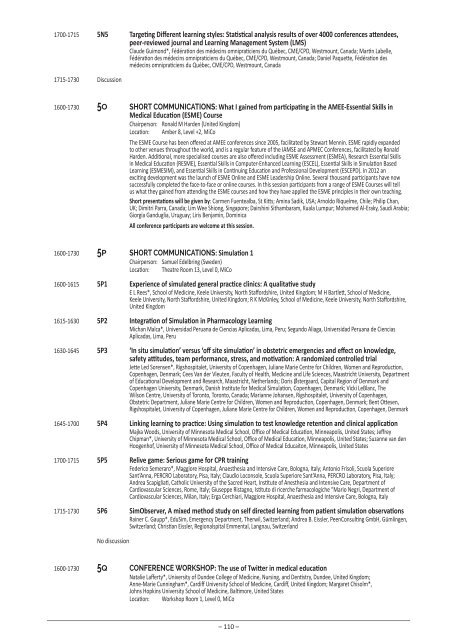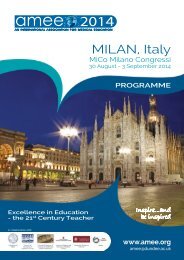Ac1xd
Ac1xd
Ac1xd
Create successful ePaper yourself
Turn your PDF publications into a flip-book with our unique Google optimized e-Paper software.
1700-1715 5N5 Targeting Different learning styles: Statistical analysis results of over 4000 conferences attendees,peer-reviewed journal and Learning Management System (LMS)Claude Guimond*, Fédération des médecins omnipraticiens du Québec, CME/CPD, Westmount, Canada; Martin Labelle,Fédération des médecins omnipraticiens du Québec, CME/CPD, Westmount, Canada; Daniel Paquette, Fédération desmédecins omnipraticiens du Québec, CME/CPD, Westmount, Canada1715-1730 Discussion1600-1730 5O SHORT COMMUNICATIONS: What I gained from participating in the AMEE-Essential Skills inMedical Education (ESME) CourseChairperson: Ronald M Harden (United Kingdom)Location: Amber 8, Level +2, MiCoThe ESME Course has been offered at AMEE conferences since 2005, facilitated by Stewart Mennin. ESME rapidly expandedto other venues throughout the world, and is a regular feature of the IAMSE and APMEC Conferences, facilitated by RonaldHarden. Additional, more specialised courses are also offered including ESME Assessment (ESMEA), Research Essential Skillsin Medical Education (RESME), Essential Skills in Computer-Enhanced Learning (ESCEL), Essential Skills in Simulation BasedLearning (ESMESIM), and Essential Skills in Continuing Education and Professional Development (ESCEPD). In 2012 anexciting development was the launch of ESME Online and ESME Leadership Online. Several thousand participants have nowsuccessfully completed the face-to-face or online courses. In this session participants from a range of ESME Courses will tellus what they gained from attending the ESME courses and how they have applied the ESME principles in their own teaching.Short presentations will be given by: Carmen Fuentealba, St Kitts; Amina Sadik, USA; Arnoldo Riquelme, Chile; Philip Chan,UK; Dimitri Parra, Canada; Lim Wee Shiong, Singapore; Dairshini Sithambaram, Kuala Lumpur; Mohamed Al-Eraky, Saudi Arabia;Giorgia Ganduglia, Uruguay; Liris Benjamin, DominicaAll conference participants are welcome at this session.1600-1730 5P SHORT COMMUNICATIONS: Simulation 1Chairperson: Samuel Edelbring (Sweden)Location: Theatre Room 13, Level 0, MiCo1600-1615 5P1 Experience of simulated general practice clinics: A qualitative studyE L Rees*, School of Medicine, Keele University, North Staffordshire, United Kingdom; M H Bartlett, School of Medicine,Keele University, North Staffordshire, United Kingdom; R K McKinley, School of Medicine, Keele University, North Staffordshire,United Kingdom1615-1630 5P2 Integration of Simulation in Pharmacology LearningMichan Malca*, Universidad Peruana de Ciencias Aplicadas, Lima, Peru; Segundo Aliaga, Universidad Peruana de CienciasAplicadas, Lima, Peru1630-1645 5P3 ‘In situ simulation’ versus ‘off site simulation’ in obstetric emergencies and effect on knowledge,safety attitudes, team performance, stress, and motivation: A randomized controlled trialJette Led Sorensen*, Rigshospitalet, University of Copenhagen, Juliane Marie Centre for Children, Women and Reproduction,Copenhagen, Denmark; Cees Van der Vleuten, Faculty of Health, Medicine and Life Sciences, Maastricht University, Departmentof Educational Development and Research, Maastricht, Netherlands; Doris Østergaard, Capital Region of Denmark andCopenhagen University, Denmark, Danish Institute for Medical Simulation, Copenhagen, Denmark; Vicki LeBlanc, TheWilson Centre, University of Toronto, Toronto, Canada; Marianne Johansen, Rigshospitalet, University of Copenhagen,Obstetric Department, Juliane Marie Centre for Children, Women and Reproduction, Copenhagen, Denmark; Bent Ottesen,Rigshospitalet, University of Copenhagen, Juliane Marie Centre for Children, Women and Reproduction, Copenhagen, Denmark1645-1700 5P4 Linking learning to practice: Using simulation to test knowledge retention and clinical applicationMajka Woods, University of Minnesota Medical School, Office of Medical Education, Minneapolis, United States; JeffreyChipman*, University of Minnesota Medical School, Office of Medical Education, Minneapolis, United States; Suzanne van denHoogenhof, University of Minnesota Medical School, Office of Medical Educaiton, Minneapolis, United States1700-1715 5P5 Relive game: Serious game for CPR trainingFederico Semeraro*, Maggiore Hospital, Anaesthesia and Intensive Care, Bologna, Italy; Antonio Frisoli, Scuola SuperioreSant’Anna, PERCRO Laboratory, Pisa, Italy; Claudio Loconsole, Scuola Superiore Sant’Anna, PERCRO Laboratory, Pisa, Italy;Andrea Scapigliati, Catholic University of the Sacred Heart, Institute of Anesthesia and Intensive Care, Department ofCardiovascular Sciences, Rome, Italy; Giuseppe Ristagno, Istituto di ricerche farmacologiche “Mario Negri, Department ofCardiovascular Sciences, Milan, Italy; Erga Cerchiari, Maggiore Hospital, Anaesthesia and Intensive Care, Bologna, Italy1715-1730 5P6 SimObserver, A mixed method study on self directed learning from patient simulation observationsRainer C. Gaupp*, EduSim, Emergency Department, Therwil, Switzerland; Andrea B. Eissler, PeenConsulting GmbH, Gümlingen,Switzerland; Christian Eissler, Regionalspital Emmental, Langnau, SwitzerlandNo discussion1600-1730 5Q CONFERENCE WORKSHOP: The use of Twitter in medical educationNatalie Lafferty*, University of Dundee College of Medicine, Nursing, and Dentistry, Dundee, United Kingdom;Anne-Marie Cunningham*, Cardiff University School of Medicine, Cardiff, United Kingdom; Margaret Chisolm*,Johns Hopkins University School of Medicine, Baltimore, United StatesLocation: Workshop Room 1, Level 0, MiCo– 110 –



